 1 citations,
November 1976 in “Archives of Dermatology”
1 citations,
November 1976 in “Archives of Dermatology” Dermatopathology has made significant progress but many skin diseases remain incurable, requiring ongoing research.
 1 citations,
July 1973 in “British Journal of Dermatology”
1 citations,
July 1973 in “British Journal of Dermatology” The document concludes that secondary syphilis cases are increasing and often misdiagnosed, pityriasis rubra pilaris can be distinguished from psoriasis by skin cell features, and different skin layers produce specific components during skin repair.
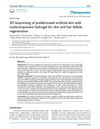 February 2025 in “Theranostics”
February 2025 in “Theranostics” 3D bioprinting with special hydrogels can create artificial skin that heals wounds and regrows hair in mice.
 April 2024 in “Medical & clinical research”
April 2024 in “Medical & clinical research” More research is needed to find the best long-term treatments for Alopecia Areata.
 April 2024 in “Research Square (Research Square)”
April 2024 in “Research Square (Research Square)” Selenium supplements can help improve symptoms and metabolic markers in lupus patients.
 April 2024 in “International Journal of Research Publication and Reviews”
April 2024 in “International Journal of Research Publication and Reviews” Alopecia areata causes hair loss with varied treatment responses and frequent relapses.
 April 2024 in “Research Square (Research Square)”
April 2024 in “Research Square (Research Square)” A 27-year-old with APS-1 showed improvement in symptoms after treatment.
 March 2024 in “Vestnik Rossijskogo universiteta družby narodov. Seriâ Agronomiâ i životnovodstvo”
March 2024 in “Vestnik Rossijskogo universiteta družby narodov. Seriâ Agronomiâ i životnovodstvo” Wnt and Shh signaling are key in noggin-induced tumors, and blocking them can slow tumor growth.
 March 2024 in “Frontiers in genetics”
March 2024 in “Frontiers in genetics” Different types of fibroblasts play specific roles in wound healing and cancer, which could help improve treatments.
 January 2024 in “Polski Merkuriusz Lekarski”
January 2024 in “Polski Merkuriusz Lekarski” Pica disorder in central Iraq is mainly found in females and is linked to low iron levels; treatment with iron improves most patients.
 December 2023 in “Frontiers in microbiology”
December 2023 in “Frontiers in microbiology” Mannan oligosaccharides improve raccoon dogs' fur quality and overall health.
 December 2023 in “Intisari Sains Medis”
December 2023 in “Intisari Sains Medis” SLE and DM can coexist but are rare and need careful evaluation.
 November 2023 in “Scientific reports”
November 2023 in “Scientific reports” The research identified and described a gene important for hormone conversion in endangered catfish, which varies in activity during different reproductive stages and after hormone treatment.
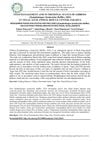 October 2023 in “Al-Kauniyah”
October 2023 in “Al-Kauniyah” Gibbons at Tegal Alur Animal Rescue Center need better feed management to improve their health and weight.
 September 2023 in “Journal of Parasite Science”
September 2023 in “Journal of Parasite Science” The dog's skin condition improved significantly after seven days of treatment.
 September 2023 in “Journal of Nepal Paediatric Society”
September 2023 in “Journal of Nepal Paediatric Society” Skin infections and rashes are the most common skin problems in children.
 September 2023 in “Cureus”
September 2023 in “Cureus” Early recognition and treatment of atypical alopecia areata in infants are crucial.
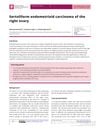 July 2023 in “Endocrinology, diabetes & metabolism case reports”
July 2023 in “Endocrinology, diabetes & metabolism case reports” Sertoliform endometrioid carcinoma of the ovary, though rare, has a good prognosis when treated early.

COVID-19 can cause skin problems and affect dermatology treatments, with recommendations for skin care and cautious use of certain drugs.
 May 2023 in “Sučasna pedìatrìâ. Ukraïna”
May 2023 in “Sučasna pedìatrìâ. Ukraïna” An 11-year-old child with total hair loss may have a genetic autoimmune disease, and the outlook for hair regrowth is not good.

A 12-year-old girl was misdiagnosed with alopecia areata but actually had a nevus sebaceus with a genetic mutation.
 March 2023 in “PARIPEX INDIAN JOURNAL OF RESEARCH”
March 2023 in “PARIPEX INDIAN JOURNAL OF RESEARCH” Tofacitinib helped regrow hair in most patients with severe hair loss.
 February 2023 in “Malaysian Journal of Science. Series B, Physical & Earth Sciences”
February 2023 in “Malaysian Journal of Science. Series B, Physical & Earth Sciences” Analyzing bear poop helps measure their stress without harming them.
 January 2023 in “Research Square (Research Square)”
January 2023 in “Research Square (Research Square)” Hair glycation could be a reliable non-invasive indicator of blood glucose control, but its use is limited by factors like sample collection and hair treatments.
 January 2023 in “Integrative Journal of Medical Sciences”
January 2023 in “Integrative Journal of Medical Sciences” A young Saudi girl with uncontrolled type 1 diabetes and hypothyroidism had two rare conditions, Mauriac syndrome and Van Wyk–Grumbach syndrome.

There is no cure for myotonic dystrophy type 1, so treatment focuses on managing symptoms and complications.
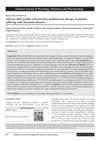 January 2023 in “National journal of physiology, pharmacy and pharmacology”
January 2023 in “National journal of physiology, pharmacy and pharmacology” Low-dose methotrexate is generally safe but can cause mild to severe side effects, and folic acid can reduce these risks.
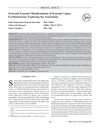 November 2022 in “Journal of The Pakistan Dental Association”
November 2022 in “Journal of The Pakistan Dental Association” Oral ulcers are common in SLE patients and often link to other symptoms.
 August 2022 in “International journal of research in pharmacy and chemistry”
August 2022 in “International journal of research in pharmacy and chemistry” Teak is a durable, termite-resistant wood with medicinal benefits.
 August 2022 in “bioRxiv (Cold Spring Harbor Laboratory)”
August 2022 in “bioRxiv (Cold Spring Harbor Laboratory)” Mouse touch-sensitive nerve cells adjust their connections based on competition with other similar cells.






























